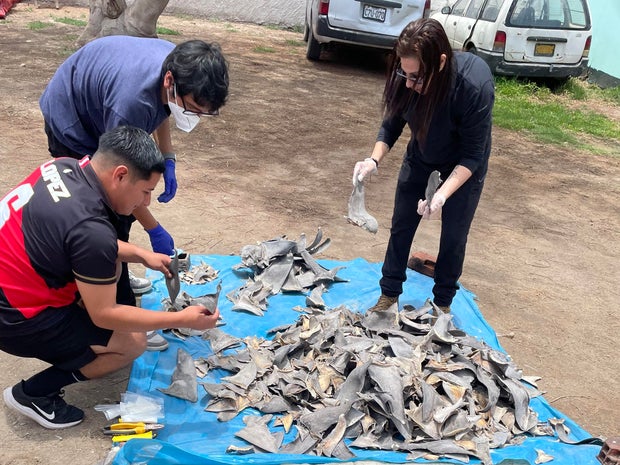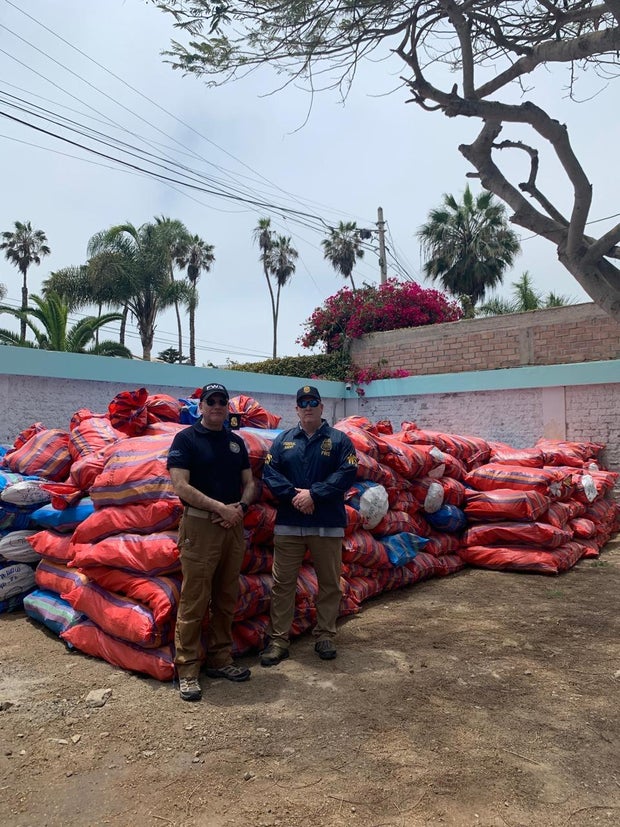U.S. authorities have assisted the Peruvian government in seizing an estimated 10,000 individual shark fins destined for China – one of the largest wildlife trafficking operations in Latin American history.
The bust, on Nov. 10 at an industrial port outside of Lima, led to the arrest of three men tied to a transnational criminal network involved in illegal fishing and wildlife smuggling, according to the United States Fish and Wildlife Service.
 U.S. authorities recently assisted the Peruvian government in seizing an estimated 10,000 individual shark fins destined for China.
United States Embassy, Peru
U.S. authorities recently assisted the Peruvian government in seizing an estimated 10,000 individual shark fins destined for China.
United States Embassy, Peru
The cruelty behind the shark fin trade is well-documented. Shark finning often involves slicing fins off live sharks and discarding the mutilated animals back into the ocean, where they die from blood loss, suffocation or predation. The practice is banned in many countries but persists due to weak enforcement and high profits.
Shark fins are prized in Chinese cuisine, particularly for shark fin soup, which is associated with status and celebration, according to the nonprofit Shark Stewards. It's a dish that can sell for $100 a bowl and continues to drive a lucrative black market.
 The fins, valued at more than $11.2 million, were sourced from threatened species including blue sharks, pelagic thresher sharks and common thresher sharks.
United States Embassy, Peru
The fins, valued at more than $11.2 million, were sourced from threatened species including blue sharks, pelagic thresher sharks and common thresher sharks.
United States Embassy, Peru
Despite growing awareness and some regulatory crackdowns, the global demand for shark fins remains strong. The United Nations estimates the illegal wildlife trade generates up to $20 billion annually, rivaling the drug and arms trades in scale and sophistication.
"The billion-dollar fin and meat trade is driving the extinction of iconic shark and ray species. Now, more than ever, critical action must be taken before it's too late," Luke Warwick, director of Shark and Ray Conservation for the Wildlife Conservation Society, told CBS News.
The operation was led by Peru's Organized Crime Investigation Division of the Environmental. The fins, valued at more than $11.2 million, were sourced from threatened species including blue sharks, pelagic thresher sharks and common thresher sharks.
Authorities say the criminal network purchased fins from Ecuadorian fishermen and laundered them through falsified documents claiming the catch originated in Peruvian waters. Once dried and stored in Callao, Peru, outside Lima, the fins were prepared for export to China.
 U.S. authorities assisted the Peruvian government in seizing an estimated 10,000 individual shark fins destined for China.
United States Embassy, Peru
U.S. authorities assisted the Peruvian government in seizing an estimated 10,000 individual shark fins destined for China.
United States Embassy, Peru
"The U.S. Fish and Wildlife Service, in close partnership with the Peruvian National Police, is taking decisive action to dismantle the illegal shark fin trade. Together, we are committed to protecting sharks, and preserving the health of our oceans, for future generations," Doug Ault, deputy assistant director for law enforcement at the USFWS, told CBS News.
Sharks play a critical role in maintaining healthy marine ecosystems. As apex predators, their decline can trigger cascading effects, including the collapse of coral reefs and fisheries. Many shark species reproduce slowly, making them especially vulnerable to overexploitation.
While the bust marks a significant victory for law enforcement, it also highlights the scale of the challenge. The black market for wildlife products continues to thrive, driven by international demand, corruption and limited oversight, according to the U.N. For now, the 9.3 tons of fins seized in Peru represent a stark reminder of the global cost of environmental crime.


















































